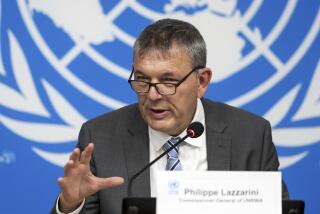Israeli agent ties charity to terrorists
- Share via
DALLAS — Amid extraordinary secrecy and security, the Israeli government took a key role Wednesday in helping the U.S. Justice Department prosecute American citizens accused of supporting anti-Israeli terrorists.
An Israeli intelligence official testifying under an assumed name in a closed courtroom told a federal jury here that a now-defunct Islamic charity in the United States was part of a global fundraising network that helped finance terrorism by the Palestinian group Hamas.
The assertions by an Israeli Security Agency officer, identified as “Avi,” are pivotal to U.S. government claims that the Holy Land Foundation for Relief and Development and five of its former officers knowingly funded extremists in the guise of charity. The allegation is denied by the defendants, all but one of whom is a U.S. citizen.
During his first day on the witness stand, Avi testified that Holy Land and other fundraising groups surreptitiously raised vast sums of money abroad that were funneled to Hamas through a network of local charities in the West Bank and Gaza.
He said that those charities, known as zakat committees, provided not only the lifeblood of Hamas’ social work but helped support families of suicide bombers, Israeli prisoners and others.
“This network was formed by design; it wasn’t created out of the blue,” he said under questioning by Assistant U.S. Atty. Elizabeth J. Shapiro.
The intelligence agent testified that Israel had seized evidence from overseas charities and gathered other information supporting his claims, including interviews with Hamas officials.
In its 2004 indictment, the government alleged that Holy Land, originally located in Los Angeles, effectively supported terrorist attacks overseas by contributing millions of dollars to nine zakat committees or other facilities controlled by Hamas.
On Wednesday, the Israeli agent was questioned about four of those charities including the Jenin Zakat Committee. He said that it was run by at least eight Hamas activists, four of whom were members of its military wing. One was convicted in Israel of a 2002 suicide attack that killed eight.
Holy Land officials have long argued through their attorneys that they rejected terrorism and provided only charitable funding.
They said the were the targets of harassment by the Israeli government and Jewish groups that predated the indictment and were angered by U.S. government orders that closed the foundation shortly after the terrorist attacks of Sept. 11, 2001.
Foundation officials have specifically denied providing financial or political support to Hamas and have said in court filings and interviews that they were unaware of any alleged zakat committee connections to Hamas.
During the trial, now in its fourth week, Islamic groups and Holy Land supporters have criticized the government’s case, taking particular exception to prosecutors listing about 300 Islamic groups and individuals as unindicted co-conspirators. Some include mainstream organizations.
One of them, the Washington-based Council on American Islamic Relations, has filed a motion to toss out the list on grounds that it violates the 1st and 5th amendments and unfairly smears organizations and individuals that are not accused of any crimes.
Foundation supporters also have taken issue with U.S. District Judge A. Joe Fish’s handling of the case. Much of that criticism centers on his decision to allow the Israeli intelligence officer and an Israeli military official, who testified last week, to appear before the jury using pseudonyms and in a courtroom open only to attorneys, government agents and the immediate families of the defendants.
Israel insisted on the protective measures as a condition for allowing its agents to testify, but it is regarded an a highly unusual, even extraordinary, concession in a U.S. courtroom. Defense lawyers fought it without success.
Outside the federal courthouse, demonstrators held signs protesting the case, including one that read: “Secret evidence + secret witness = reasonable doubt.”
--
More to Read
Sign up for Essential California
The most important California stories and recommendations in your inbox every morning.
You may occasionally receive promotional content from the Los Angeles Times.













